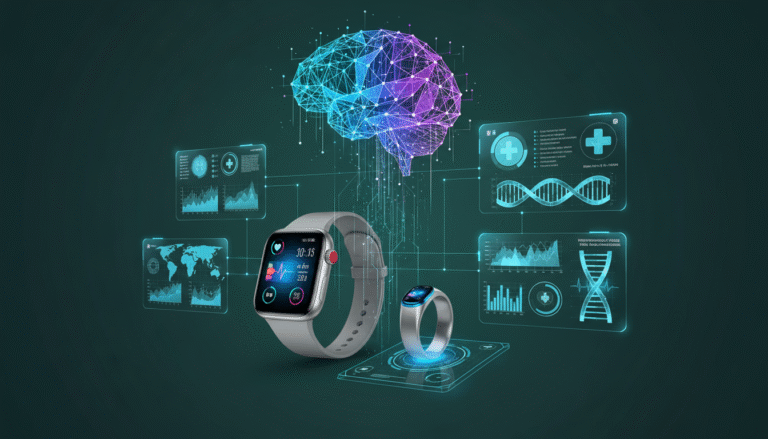
IGC Pharma (NYSE:IGC) announced an expansion of its AI-powered in-silico drug discovery platform on November 3, 2025, adding retrosynthetic analysis, molecular docking, toxicology/genotoxic assessment, and predictive bioactivity modeling.
The upgrade aims to accelerate identification and optimization of Alzheimer’s candidates by prioritizing compounds in its patent portfolio, predicting target interactions, and flagging toxicity earlier to reduce experimental burden. Ongoing programs noted include IGC-AD1 (Phase 2), TGR-63 (preclinical plaque clearance in cortex and hippocampus), IGC-1C (tau/GLP-1 dual action), and IGC-1A (AI-identified GLP-1 agonist).
IGC Pharma (NYSE:IGC) ha annunciato l’espansione della sua piattaforma di scoperta di farmaci in silico guidata dall’IA il 3 novembre 2025, aggiungendo analisi retrosintetiche, docking molecolare, valutazione della tossicologia/genotossicità e modellazione predittiva di bioattività.
L’aggiornamento mira ad accelerare l’identificazione e l’ottimizzazione dei candidati per l’Alzheimer dando priorità ai composti nel suo portafoglio di brevetti, prevedendo le interazioni con le bersagli e segnalando la tossicità in modo precoce per ridurre il carico sperimentale. I programmi in corso menzionati includono IGC-AD1 (Fase 2), TGR-63 (preclinico di clearance delle placche nella corteccia e nell’ippocampo), IGC-1C (duale azione tau/GLP-1) e IGC-1A (agonista GLP-1 identificato dall’IA).
IGC Pharma (NYSE:IGC) anunció una expansión de su plataforma de descubrimiento de fármacos in silico impulsada por IA el 3 de noviembre de 2025, añadiendo análisis retrosintéticos, acoplamiento molecular, evaluación de toxicología/genotoxicidad y modelado predictivo de bioactividad.
La mejora tiene como objetivo acelerar la identificación y optimización de candidatos para Alzheimer al priorizar compuestos en su cartera de patentes, predecir interacciones con dianas y señalar toxicidad en etapas tempranas para reducir la carga experimental. Se mencionan programas en curso como IGC-AD1 (Fase 2), TGR-63 (preclínico de eliminación de placas en corteza e hipocampo), IGC-1C (acción dual tau/GLP-1) e IGC-1A (agonista de GLP-1 identificado por IA).
IGC Pharma (NYSE:IGC)가 IA로 구동되는 AI 기반 인실리코 약물 발견 플랫폼의 확장을 2025년 11월 3일에 발표하고 retrosynthetic 분석, 분자 도킹, 독성/발유전독성 평가, 예측 생물활성 모델링을 추가했습니다.
이번 업그레이드의 목표는 특허 포트폴리오의 화합물을 우선순위로 두고 표적 상호작용을 예측하며 조기에 독성을 표시해 실험 부담을 줄이고 알츠하이머 후보 물질의 식별 및 최적화를 가속화하는 것입니다. 진행 중인 프로그램으로는 IGC-AD1(2상), TGR-63(피질과 해마에서의 플라크 제거를 위한 전임상), IGC-1C(타우/GLP-1 이중 작용), IGC-1A(AI가 식별한 GLP-1 작용제)가 언급되어 있습니다.
IGC Pharma (NYSE:IGC) a annoncé l’extension de sa plateforme de découverte de médicaments in silico pilotée par l’IA le 3 novembre 2025, ajoutant l’analyse rétro-synthétique, le docking moléculaire, l’évaluation toxicologique/génotoxicité et la modélisation prédictive de l’activité biologique.
La mise à niveau vise à accélérer l’identification et l’optimisation des candidats pour Alzheimer en donnant la priorité aux composés de son portefeuille de brevets, en prédisant les interactions avec les cibles et en signalant la toxicité plus tôt afin de réduire la charge expérimentale. Les programmes en cours mentionnés incluent IGC-AD1 (Phase 2), TGR-63 (préclinique de clairance des plaques dans le cortex et l’hippocampe), IGC-1C (action double tau/GLP-1) et IGC-1A (agoniste GLP-1 identifié par l’IA).
IGC Pharma (NYSE:IGC) kündigte am 3. November 2025 eine Erweiterung seiner KI-gestützten In-Silico-Datenplattform für die Arzneimittelentdeckung an und fügte retrosynthetische Analysen, molekulares Docking, Toxizitäts-/Genotoxizitätsbewertungen und prädiktive Bioaktivitätsmodellierung hinzu.
Dieses Upgrade zielt darauf ab, die Identifizierung und Optimierung von Alzheimer-Kandidaten zu beschleunigen, indem Verbindungen im Patentportfolio priorisiert, Zielinteraktionen vorhergesagt und Toxizität früher erkannt wird, um die experimentelle Belastung zu reduzieren. Laufende Programme umfassen IGC-AD1 (Phase 2), TGR-63 (Präklinik zur Plaquereinigung im Kortex und Hippocampus), IGC-1C (Tau/GLP-1-Doppelwirkung) und IGC-1A (KI-identifizierter GLP-1-Agonist).
IGC Pharma (NYSE:IGC) أعلنت عن توسيع منصة اكتشاف الأدوية في المحاكاة باستخدام الذكاء الاصطناعي في 3 نوفمبر 2025، مضيفة تحليلًا رجعيًا للتخليق، وارتباط جزيئي، وتقييم السمية/الطفرة الوراثية، ونمذجة التنبؤ بالنشاط الحيوي.
يهدف التحديث إلى تسريع تحديد وتحسين المرشحين لمرض الزهايمر من خلال إعطاء أولوية للمركبات في محفظة براءات الاختراع، وتوقع التفاعلات مع الأهداف، وكشف السمية مبكرًا لتقليل العبء التجريبي. وتشمل البرامج الجارية المذكورة IGC-AD1 (المرحلة 2)، TGR-63 (التPreclinical لإزالة اللويحات في القشرة hippocampus)، IGC-1C (تفاعل ثنائي Tau/GLP-1)، و IGC-1A (محفز GLP-1 تم تحديده بالذكاء الاصطناعي).
Positive
- Platform expanded to include docking, retrosynthesis, toxicology, and bioactivity modeling
- IGC-AD1 currently in Phase 2 clinical trials
- TGR-63 preclinical showed significant plaque clearance in cortex and hippocampus
Negative
- Programs remain early-stage: lead candidate is Phase 2 and others are preclinical
- No financial or timeline metrics disclosed for platform impacts or program milestones
POTOMAC, MARYLAND / ACCESS Newswire / November 3, 2025 / IGC Pharma, Inc. (“IGC Pharma,” “IGC,” or the “Company”) (NYSE American:IGC), a clinical-stage biotechnology company leveraging AI to develop innovative treatments for Alzheimer’s disease, today announced an expansion of its AI-powered in-Silico drug discovery platform. The company is now integrating more methodologies, including retrosynthetic analysis, molecular docking, toxicology and genotoxic assessments, and predictive bioactivity modeling, to accelerate the identification and optimization of therapeutic candidates for Alzheimer’s disease (AD) and related disorders.
This strategic enhancement aims to optimize the drug development process, reducing the time and resources traditionally required for compound screening and lead optimization. By leveraging AI-driven tools, IGC Pharma seeks to identify promising molecular structures within its patent portfolio more efficiently, predict their interactions with biological targets, and assess their potential efficacy and safety profiles early in the development cycle.
“The incorporation of these advanced in-silico techniques marks an important advancement in our drug discovery efforts,” said Ram Mukunda, CEO of IGC Pharma. “By simulating and analyzing molecular interactions computationally, we can prioritize the most promising candidates for synthesis and experimental validation, thereby accelerating our pipeline. This integration underscores our commitment to utilizing cutting-edge technologies, including our AI-driven MINT-AD model, to transform the discovery and development of novel therapeutics for neurodegenerative diseases. Our goal is to bring effective treatments to patients sooner and address the urgent unmet needs of patients and caregivers affected by Alzheimer’s disease.”
IGC Pharma’s expanded platform includes:
-
Toxicology and genotoxic assessments: Predict potential adverse effects of compounds, enabling early identification of toxicity risks and reducing reliance on animal testing.
-
Predictive Bioactivity Modeling: Forecast the biological activity of compounds across various targets, including CB1, CB2, dopamine, serotonin, muscarinic, GLP-1, and GIP receptors.
-
Molecular Docking Simulations: Predict the binding affinity and orientation of small molecules within target protein sites, aiding in the assessment of therapeutic potential.
-
Retrosynthetic Analysis: Decomposing complex molecules into simpler precursors facilitates the design of feasible synthetic pathways.
These enhancements complement IGC Pharma’s ongoing efforts to develop innovative treatments for AD. The company’s lead candidate, IGC-AD1, is currently in Phase 2 clinical trials targeting agitation in Alzheimer’s patients and has shown potential to inhibit amyloid-beta aggregation, prevent neurofibrillary tangle formation, and enhance mitochondrial function. The TGR‑63 program focuses on amyloid plaque reduction, with preclinical studies demonstrating significant plaque clearance in the cortex and hippocampus. Additional programs include IGC‑1C, a dual-action candidate targeting tau proteins and the GLP‑1 receptor, and IGC‑1A, an AI‑identified GLP‑1 receptor agonist offering promise for both metabolic and neurological disorders. Together, these initiatives reflect IGC Pharma’s commitment to leveraging advanced in‑silico methods and novel molecular approaches to accelerate the discovery and development of transformative therapies for neurodegenerative diseases.
About IGC Pharma (dba IGC):
IGC Pharma (NYSE American: IGC) is a clinical-stage biotechnology company leveraging AI to develop innovative treatments for Alzheimer’s and metabolic disorders. Our lead asset, IGC-AD1, is a cannabinoid-based therapy currently in a Phase 2 trial (CALMA) for agitation in Alzheimer’s dementia. Our pipeline includes TGR-63, targeting amyloid plaques, and early-stage programs focused on neurodegeneration, tau proteins, and metabolic dysfunctions. We integrate AI to accelerate drug discovery, optimize clinical trials, and enhance patient targeting. With more than 30 patent filings, 12 patents granted and a commitment to innovation, IGC Pharma is advancing breakthrough therapies.
Forward-Looking Statements:
This press release contains forward-looking statements. These forward-looking statements are based largely on IGC Pharma’s expectations and are subject to several risks and uncertainties, certain of which are beyond IGC Pharma’s control. Actual results could differ materially from these forward-looking statements as a result of, among other factors, the Company’s failure or inability to commercialize one or more of the Company’s products or technologies, including the products or formulations described in this release, or failure to obtain regulatory approval for the products or formulations, where required, or government regulations affecting AI or the AI algorithms not working as intended or producing accurate predictions; general economic conditions that are less favorable than expected; the FDA’s general position regarding cannabis- and hemp-based products; and other factors, many of which are discussed in IGC Pharma’s U.S. Securities and Exchange Commission (“SEC”) filings. IGC incorporates by reference its Annual Report on Form 10-K filed with the SEC on June 27, 2025, as if fully incorporated and restated herein. Considering these risks and uncertainties, there can be no assurance that the forward-looking information contained in this release will occur. IGC Pharma, Inc. assumes no obligation to update forward-looking statements contained in this release as the result of new information or future events or developments.
Contact Information:
Rosalyn Christian / John Nesbett
IMS Investor Relations
igc@imsinvestorrelations.com
(203) 972-9200
SOURCE: IGC Pharma, Inc.
View the original press release on ACCESS Newswire
FAQ
What did IGC Pharma (IGC) announce on November 3, 2025 about its AI drug discovery platform?
IGC announced expansion of its in-silico platform to add retrosynthetic analysis, molecular docking, toxicology/genotoxic assessment, and predictive bioactivity modeling.
What is the development status of IGC-AD1 (IGC) after the November 3, 2025 announcement?
IGC-AD1 is reported as being in Phase 2 clinical trials targeting agitation in Alzheimer’s patients.
What preclinical results did IGC report for the TGR-63 program in the November 3, 2025 release?
TGR-63 preclinical studies demonstrated significant plaque clearance in the cortex and hippocampus.
How will IGC’s expanded AI tools affect drug screening and lead optimization for IGC (IGC)?
The company says the tools aim to accelerate candidate identification, predict target interactions, and identify toxicity risks earlier to reduce time and resources for synthesis and testing.
Which targets does IGC’s predictive bioactivity modeling cover per the November 3, 2025 announcement?
Predictive bioactivity modeling covers CB1, CB2, dopamine, serotonin, muscarinic, GLP-1, and GIP receptors.





